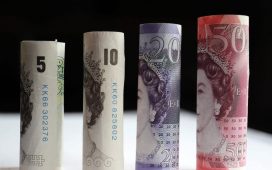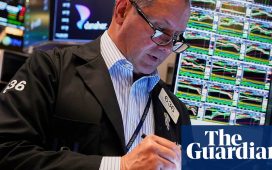Global stock markets climbed in 2024, helped by falling inflation and the US economy’s success in avoiding a hangover from a strong post-pandemic recovery.
While Europe and the UK struggled to make headway, the US maintained pole position at the top of the rich nations’ growth league, pushing shares in New York to new record highs.
However,the year ended with jitters in the bond market, as investors feared that central bankers had failed to slay inflationary pressures, forcing many to rip up forecasts about likely cuts in interest rates.
Daniele Antonucci, chief investment officer at Quintet Private Bank, says “2024 was a masterclass in unpredictability.”
“Despite earlier concerns, the US avoided a recession, the eurozone and UK experienced only mild downturns, and China picked up steam towards the end of the year. While there were occasional spikes in market volatility, the overall story of 2024 was one of growth – powered in no small part by structural themes, including the rapid rise of new technologies,” Antonucci adds.
Shares
Equities, especially technology stocks listed in the US, had another good year in 2024. Markets shrugged off a brief plunge in early August, but did end the year with a slight wobble, as global stocks fell by 2.7% during December.
The tech-focused Nasdaq had its second strong year in a row, surging by over 28% during 2024. Chipmaker Nvidia led the charge, up over 170% over the last 12 months, as frenzied demand for its semiconductors to run artificial intelligence systems swelled its revenues and profits.
Other tech companies also boomed: Alphabet gained 35%, Meta rose 65% while Tesla had a very strong year too, gaining 62%.
The broader S&P 500 hit a series of record highs, prompting Wall Street forecasters to revise up their targets for the index during the year.
In the private markets, Elon Musk’s SpaceX doubled in value to $350bn, based on the price of anemployee share buyback programme.
“It has been Elon Musk’s year,” said Bill Blain, market strategist at Windshift Capital, adding that Musk, an adviser to president-elect Donald Trump, may have a difficult year ahead. “They say pride cometh before a fall. Whom the gods intend to destroy they first build up,” he added.
The UK market lagged behind the US, though, with London’s FTSE 100 rising by 5.7% in 2024.
It was a year of two halves for the Footsie. Strong gains early in 2024 drove the index to a record high of 8474 points in May, before it weakened in September, October and December, to finish at 8173 points, up 440 points in the year.
It was a better year for investors in Frankfurt, while those in Paris had a tougher time.
Germany’s DAX gained 19% in 2024, despite a political crisis, economic stagnation and a slump at its carmarkers. France’s CAC dipped by 2.1%, in a year which brought the country four prime ministers.
Lori Heinel, global chief investment officer at State Street Global Advisors, says “2024 was no ordinary year, with elections around the world, persistent inflation and market volatility all playing their part in building an uncertain macroeconomic environment. Despite these challenges, markets continued to be resilient.”
The pound
Sterling ended 2024 roughly where it began against the dollar, at about $1.25.
A strong third-quarter drove the pound to a two-year high of more than $1.34 in September, when the Bank of England left interest rates on hold. But since then, sterling has been on the slide against a strengthening dollar.
The pound had a better year against the euro, rising from €1.15 to €1.20, on expectations that the European Central Bank will cut interest rates faster than the Bank of England this year.
Bonds
The interest rate on government bonds from many advanced economies actually rose in 2024, defying expectations. These rates, known as yields, remained high because central banks cut borrowing costs at a rather lower pace than forecast, a trend that may continue if inflation picks up.
UK 10-year bond yields climbed from 3.6% at the start of January 2024 to almost 4.6% by the end of December. That puts them back at levels seen after Liz Truss’s calamitous mini-budget (although it was the speed at which bond yields surged that really alarmed the markets in September 2022).
after newsletter promotion
Rising UK bond yields will worry Rachel Reeves, as it eats into the headroom available to the chancellor to hit her fiscal rules at current tax and spending levels.
US 10-year Treasury yields have also climbed in 2024, notably in the last three months of the year. Worryingly, US borrowing costs have risen since the Federal Reserve began cutting interest rates last autumn. The Fed has lowered its key rate by 100 basis points, or 1%, since it started cutting in September. Over the same time, US 10-year Treasury yields have risen by about 100bps – a sign that investors don’t believe inflation is beaten.
Oil
Brent crude ended the year lower than where it started it, pulled down by forecasts that the oil market could be over-supplied in 2025.
Having touched $79/barrel at the start of January, Brent crude was changing hands for $74/barrel on the last day of the year.
At one stage oil threatened to hit $100/barrel, amid fears that the Middle East crisis would hurt production and output.
Although oil prices were supported by geopolitical tensions, they were also pulled down by concerns that demand was weakening.
During the year, Opec cut its outlook for demand in 2024 five times, due to weakness in China, India and other regions.
Matt Britzman, senior equity researcher at Hargreaves Lansdown, says the oil market was grappling with a “slippery slope of oversupply concerns” heading into 2025.
“Opec’s efforts to boost production face headwinds, with weaker demand from China, the world’s largest importer, weighing on prices. Adding fuel to the fire, president-elect Trump’s proposed tariffs and sanctions could shake the energy market, leaving oil poised for an annual decline after months of turbulent trading,” Britzman adds.
Bitcoin
Bitcoin gained 120% over the last 12 months, in another lively year for crypto assets.
Having begun the year about $43,000, bitcoin climbed to $71,000 by mid-March before spending much of the year in the $60,000 region. But Donald Trump’s election win in November sent bitcoin surging over $100,000 for the first time on expectations of a pro-crypto White House.
But while the world’s largest cryptocurrency traded as high as $108,000 in mid-December, it dropped by about $15,000 from that peak by the end of the year to near $93,700.
Bitcoin benefited from growing acceptance from traditional investors; in October, BlackRock CEO Larry Fink described it as “an alternative to other commodities like gold,” though its volatility and a lack of regulation keep it off limits for many investors.








